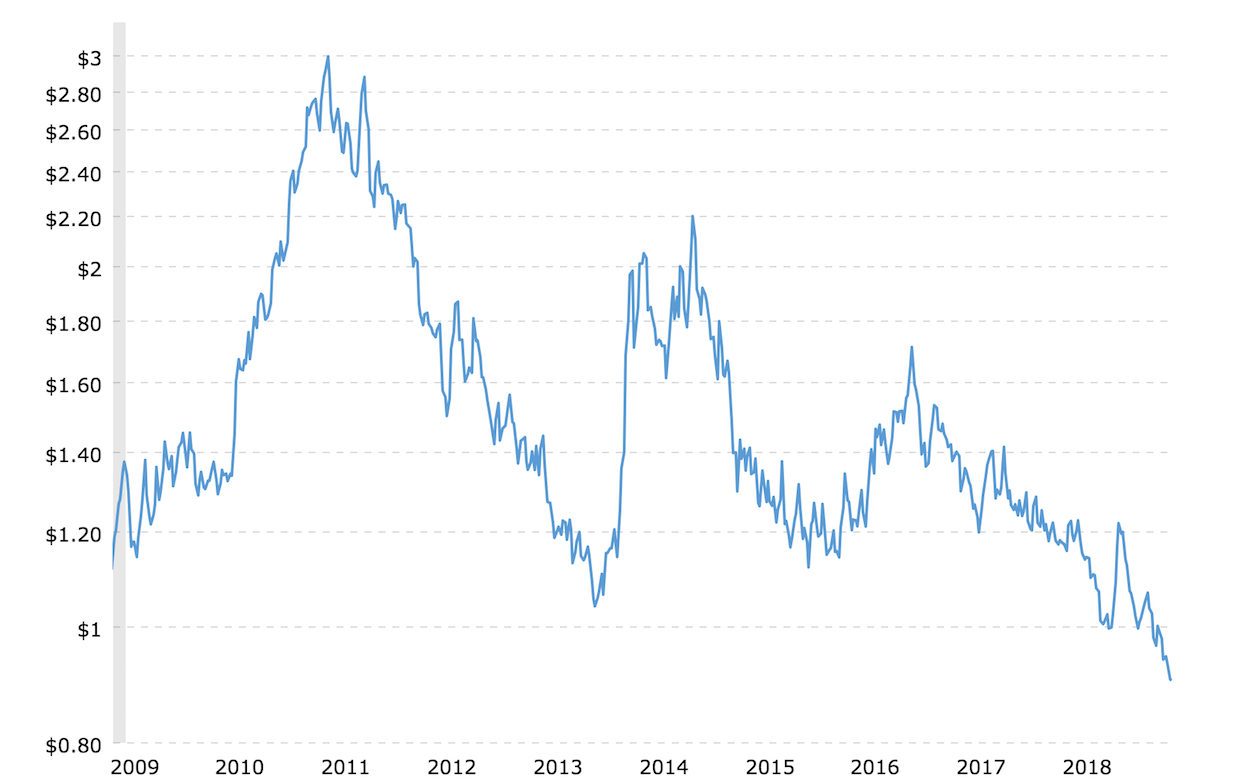SPP, the farmer-owned third-party certifier focused on smallholder producer needs, has issued a damning denouncement of the current coffee trade, as coffee C prices remain at historically low levels.
SPP and its ownership organization, SPP Global, have joined a chorus of producer organizations, development-focused NGOs, government agencies and industry associations who have made public pleas regarding coffee’s current price crisis, calling for immediate action on the part of coffee buyers and the industry at large.
A “denouncement and recognition” statement from SPP global leads with the declaration, in all capital letters, “WITH 90 DOLLARS WE CANNOT LIVE.” The group is referring to recent ICE Futures/New York Stock Exchange prices for commodity coffee, which have been hovering close to 90 cents per pound in recent weeks. As of this writing, futures prices were sitting at 92.55 cents per pound (for July), 95.30 cents (September) and 99.20 cents (December).

10-year coffee price chart used with permission, from the Macrotrends 45-year coffee price chart.
By many accounts, those kinds of prices — even when augmented by contracted premiums based on quality, origin, volume, third-party certification or other factors — mean innumerable smallholder coffee farmers throughout the world are not receiving enough money at the farmgate level to meet costs of production.
“This price does not allow, in any way, small producers to produce coffee sustainably and less to have a decent income for a dignified life,” SPP Global wrote. “This price level destroys the lives of millions of people who give their lives to the quality of this product sold at increasingly higher prices to consumers. Those companies that buy coffee at the C Market price, unfortunately, are accomplices in the loss of prospects for a decent life of millions of families of small coffee producers around the world. This also has ecological destruction ramifications and the consequential exacerbation of global climate change affecting day by day the life and future of the entire population of the planet.”
SPP’s certification scheme involves a floor price of $2.20 per pound (or $220 per 100 pounds) for certified washed Arabica coffees.
“With this price, we have managed to improve our revenues and improved the future prospects for the new generation with the full support of our commercial partners,” the group wrote. “Conscious, highly effective and supportive companies have been able to grow in the different markets with great success from specialty cafes to supermarkets while still paying the price of US $220.”
Here is the SPP Global declaration in full:
Boston, Massachusetts, SCA 2019
Denouncement and Recognition
For Justice in the International Coffee Market
More than five hundred thousand families of small organic producers organizations of coffee and other products, marketing companies and allies of SPP (Small Producers’ Symbol) on five continents, in the framework of the world’s largest specialty coffee fair, in the city of Boston, Massachusetts, USA, on April 12, 2019, we express:
WITH 90 DOLLARS WE CANNOT LIVE. The current price on the C Market of the New York Stock Exchange for Arabica coffee on April 12, 2019, is below US $90 per 100 lbs. of washed green coffee, a situation similar to that of 30 years ago. This price does not allow, in any way, small producers to produce coffee sustainably and less to have a decent income for a dignified life. This price level destroys the lives of millions of people who give their lives to the quality of this product sold at increasingly higher prices to consumers. Those companies that buy coffee at the C Market price, unfortunately, are accomplices in the loss of prospects for a decent life of millions of families of small coffee producers around the world. This also has ecological destruction ramifications and the consequential exacerbation of global climate change affecting day by day the life and future of the entire population of the planet.
WITH 220 DOLLARS WE CAN LIVE. In 2010, the SPP (Small Producers’ Symbol) coffee producers had set the minimum price necessary to produce sustainably and with organic certification, working democratically and inclusively, at US $220 per 100 pounds of washed Arabica green coffee. With this price, we have managed to improve our revenues and improved the future prospects for the new generation with the full support of our commercial partners. Conscious, highly effective and supportive companies have been able to grow in the different markets with great success from specialty cafes to supermarkets while still paying the price of US $220. We express our appreciation to these companies for their work and the great commitment with the small coffee producers. We have shown, as SPP Family, that yes you can live with a price of US $220 in the market, achieve a better life for producer communities and have a better planet.
We call on all companies in the coffee sector to become aware. Show solidarity. Work in partnership with organized small producers. Recognize while the problem is not only the price, today a minimum sustainable price of US $220 is necessary. Together we have to make consumers and markets recognize that current prices are not an option. Hunger is not an option. Forced migration is not an option. The destruction of the planet is not an option. The option for US $220 opens the door to a better world.
We count on your responsible collaboration, today and always!
— SPP, Small Producers’ Symbol
— SPP Global
Nick Brown
Nick Brown is the editor of Daily Coffee News by Roast Magazine.
Comment
2 Comments
Comments are closed.







VERY GOOD INFO, KEEP ME UPDATE, THANKS
It would seem to be the case that anyone reading this blog is NOT likely dealing in standard commodity grade coffee at all. HOW is it, then, that the C price continues to be used as the baseline for a different product? When ALL the smallholders in a given area send their cherries, or dried in pergamo coffee “down the hill” to the commodity mill, there is the strong implication that the coffee isn’t worth more, else it would not be handled that way. I am well aware of a number of local projects that have quickly and simply removed the coffee production of an area from the above-described model where the growers would MAYBE gross fifteen cents the pound at the mill. They had outside help, which not only helped them to organise and work together as a team, but to learn how to produce true specialty grade coffee and get a price commensurate with the quality that is actually in the cup. Yes the price is higher to me, but the price/quality equation is consistent with that of other high grade coffees I buy. No one was “ripping them off” under the “old system”, their product was simply NOT “specialty coffee”. When they learned how to grow better, and handle it per the proper protocols of the high grade coffee they were now producing, the entire area was transformed. In one project of which I am familiar, those people, the same ones who were content to sell their crude C grade coffees to the “mill down the hill” are now working with other groups of producers close by, teaching them how to raise the bar at every level.
One part of this SPP programme is that they seem to be demanding producers everywhere get paid the same base price. Different regioins, countries, even counties within a country, have different standards of living, costs of operation, local “CPI’s”, so how is it fair to impose a worldwide “one price suits all” structure? And what about a pracitcal range of price for the produced green coffee that truly reflects the quality in the product? Even here in the USA< most states will have different economic structures that can vary widely over a distance of even a hundred miles. What would be a price to provide a comfortable standard of life in one place would not even be enough to produce the same product at a tight margin a hundred miles away.
The nattering about the doomsday "climate change" meme is out of place in an article on this topic, too. The end of the world as we know it is not imminent, nor is the postponement of it within the capability of man to accomplish. The eruptions of Mt. St. Helens in Southwest Washigton nearlyforty years ago did more "harm" to the environment and planet than all man's activities iover the past milennium have done. The price of coffee here or there has nought to do with average temperatures onel, three, ten years hence.